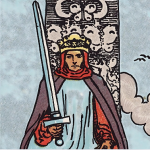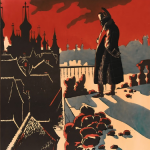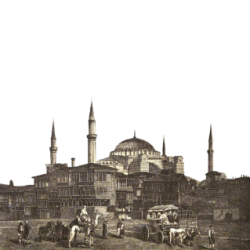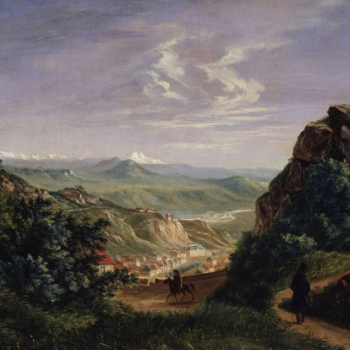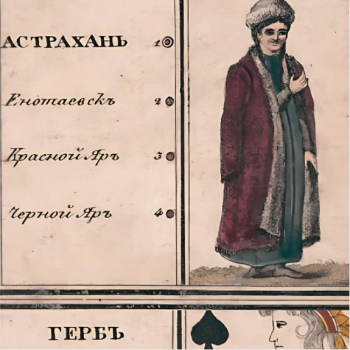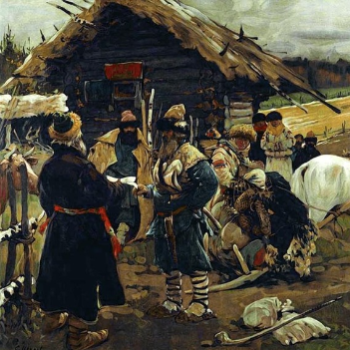A Tournament Of Shadows:
XXI. The Corsican Antichrist
The huge, striking, double-tailed comet was first seen in France on March 26, 1811, and would continue to be seen for seventeen months.[1] Adams, an advocate for astronomy in America, took a keen interest in its movements in the heavens.[2]
As for his diplomatic service, Adams found Russia a warm ally. The courteous manners of Alexander Pavlovich, his desire to conciliate the United States, and the personal conferences to which he admitted its representative, were readily acknowledged by Adams. In the midst of the splendor of the Russian Court, and the grand entertainments of its ministers and resident plenipotentiaries, the American diplomat maintained the simplicity of style suited to his salary (and to the character of the country he represented.) Though loans to an indefinite amount were offered to him by mercantile houses, Adams uniformly declined them (though under circumstances of great temptation.) “The whole of my life has been one continued experience of the difficulty of a man’s adhering to the principle of living within his income,” Adams said. “The first and most important principle of private economy.” His austere, Yankee lifestyle was not unnoticed.
As Adams was walking one morning in May 1811, he was met by Alexander Pavlovich who was also walking.
“Il ya cent ans que je ne vous ai vu,” said the Tsar, taking Adams cordially by the hand.[3] “Do you intend on taking a house in the country this summer?”
“No,” Adams replied. “I had, for some time, that intention, but I have given it up.”
“Why?”
Adams hesitated upon an answer.
“Peut être sont ce des considerations de finance,” Alexander Pavlovich replied in perfect good humor to relieve Adams from his embarrassment.[4]
With a smile, Adams replied in the same manner. “Mais, Sire, elles y sont pour une bonne parte.”[5]
“Fort bien,” said the Tsar, “vous avez raison. Il faut toujours proportionner la depense à la recette.”[6]
Adams carefully observed and noted for future thought and illustration, the customs, manners, and habits of the nobility. He detailed their people, their public institutions, architecture, monuments, and collections in the fine arts. He documented the over-weening influence of the clergy, as well as their power and political subserviency. His journal was filled with illustrations regarding the character of the foreign ministers, and the policy of the courts they represented.[7] In the spring of 1811, he recorded the Comte Luxbourg’s opinion of French religiosity.
“I believe there is very little religion in France,” the Comte Luxbourg told Adams. “When I was last there I made it a particular object of my personal observation—I had supposed before I went there that the result of the horrible Revolution through which they had passed would have been to awaken religious ideas in the people, and have given their minds a peculiar direction that way—I saw no such thing—I saw no disposition with regard to religion but that of profound indifference—It was not a fashion of infidelity such as had been known in France thirty or forty years ago—not a sectarian Atheism, courting martyrdom; but total indifference—a total absence of all thought concerning religion. I mentioned it to the Emperor Napoleon and had perceived that the remark had displeased him. He asked on what I founded my opinion—I answered: ‘As I had, before going to France, entertained the theoretic idea that I should find strong symptoms of religious propensities, I had made it a point to observe and had repeatedly gone into the principal churches of Paris on Sundays and Holidays in service time. They were all absolutely deserted. Scarcely a soul to be seen; except here and there an occasional straggler, who looked as if he had been sent upon an errand and had come into the church and taken a chair to rest himself on the way.’ The Emperor had replied: ‘Perhaps it may be so, but I assure you it is not my fault—on the contrary, I know the importance of religious sentiments, and encourage the propagation of them as much as I can. There are even five or six popular writers to whom I give pensions for this purpose, and among them are Chateaubriand and Madame de Genlis.’ Now he considers these people as drugs of the imperial pharmacopaea—ingredients to be mixed up in the chemical mass of an Emperor’s Government. His own idea is political and not at-all religious.”[8]
Some of the most damning polemics on Napoleon came from the Protestant pulpits of English and American preachers. The world-shattering events of the French Revolution spurred on Millenarian thought in England. The Welsh writer, Hester Thrale Piozzi, wrote in 1789:
The French struggling to obtain that Liberty they will not know how to use; The Rage for emancipating Negro Slaves, & the Number of Jews lately baptized into Protestant Churches; The expected Comet, and the propagation of the Gospel in so many newly-discover’d Countries, make one think the end of the World approaches—especially as we are now close upon the Year 1800. which leaves only two Centuries more, and the third Division of Time is completed—2000 Years from the Creation to the Deluge, 2000 from the Flood to the Coming of Jesus Christ—and 2000 more from his Crucifixion to his second Appearance in Glory preceded by a flaming World.[9]
There were “indeed Signs in the Sun, and in the Moon and in the Stars,” according to Piozzi, “not emblematical alone, or figurative; but literal and true.” She was convinced the World’s End was approaching. “I long sincerely to see the Jews come into the Church,” she adds, referencing Robert Fleming’s 1701 prophecy that Rome was to burn and “the Israelites to march in the Year 1848.” This mention of the Jews coming into the Church was a reference to the hope of the Jewish congregation of Amsterdam in 1796 (after the Civil Emancipation of the Netherlands Jews in 1795 following the French conquest.) It was said that the Amsterdam Jews cherished the Messianic dream of a revived Jewish state in Palestine. “The Jews are sure enough going to be converted,” writes Piozzi, “they have called a Solemn Assembly at Amsterdam […] and mean to make serious Enquiry into the Evidences of Messiah’s first coming. Conversion must follow Enquiry, so I shall live to see the great Prophecy completed, and our Saviour’s second coming will then be most surely at hand.” (This belief may have gained traction with adherents of the contemporary anti-Talmudist, pseudo-Messiah, Jacob Frank, a Polish Jew who led a sect that favored uniting with the Christians.)[10] When Napoleon called for the Grand Sanhedrin in 1806, Piozzi saw this, too, as part of the Prophecy. [11] Piozzi cited the increasing evidence of the “Antichrist” character of the French Revolution which she (and others) believed culminated in the person of Napoleon. (Piozzi collected other contemporary British confessions to popular apocalyptic expectation in her diary published posthumously in 1942 under the title Thralliana.) “People say [Napoleon] is the Devil Incarnate, the Apollyon mentioned in Scripture: His name is Apollonio pronounced according to the Corsican Dialect N’Apollione: and he does come forwards followed a Cloud devouring Locusts from ye bottomless Pit.”[12]
In 1809, on the other side of the Atlantic, an anonymous pamphlet was published in New York titled, The Identity Of Napoleon And Antechrist, which connected passages from the Biblical Book Of Revelation and Book Of Daniel to the exploits of Napoleon. Was not the Corsican the Beast prophesied to rise out of the sea? (“And I stood upon the sand of the sea, and saw a beast rise up out of the sea.”—Revelations. 13:1.) In 1811, the Reverend William C. Davis of South Carolina, published a sermon titled, The Millennium, Or S Short Sketch On The Rise And Fall Of Antichrist, in which he contends that Napoleon is the titular villain. Similar themes were found in the sermons of the New England preachers Ethan Smith and Elijah Parish, both of which tied Napoleon’s sacking of Rome and imprisonment of the Pope as clear signs of the imminent eschaton.
Then there was the Lutheran pietist clergyman, Johann Albrecht Bengel, who predicted that Jesus Christ would return in 1836 and begin His 1,000-year reign, known as the Millennium. Another man, Johann Heinrich Jung-Stilling, a leading figure among the German mystics, however, was the theologian that most influenced the shape of Russia’s apocalyptic beliefs about Napoleon. Picking up where Bengel left off, Jung-Stilling condemned the godless French Revolution and saw the Napoleonic Wars as a harbinger of the End of Days. There was something of a consensus among the mystics that the End of the World was at hand, though they differed on when, exactly, that day would be. Some felt that it would take place in 1806 (with the fall of the Holy Roman Empire.) Others believed it would be in the year 1816 or 1836. Jung-Stilling predicted the End of the World would be in 1819 based on his calculation. Assuming that one day equaled a thousand years with the Lord and the world was supposed to last for six days, Jung-Stilling reasoned that the world would last six thousand years. Using the Biblical chronology of J. G. Franck (a Hanoverian theologian) Jung-Stilling was confident that Christ was born 4181 years after the beginning of time. By subtracting 4181 from 6000, he arrived at the year 1819.[13] His ideas were first articulated in his 1794 novel Das Heimweh (Longing For Home,) the story of a religious young man who yearned to reach the Kingdom of the Lord in the East, among the Tatar tribes of Central Asia. What set Jung-Stilling apart from the Anglophone Protestant divines of Britain and America was his prediction that Russia would be Christendom’s salvation. He believed that Tsar Alexander Pavlovich would play an important messianic role in Europe by vanquishing Napoleon and bringing peace to the Continent, thus ushering in the Millennium of Christ. The influence of Jung-Stilling (and others of the German “Awakening) had a strong influence on Russian freemasonry, by de-emphasizing dogma, sacraments, and hierarchy while emphasizing “inner spirituality and personal communion with God.” Their “Awakening” would also inspire Prince Alexander Golitsyn, the childhood friend of Alexander Pavlovich. Though he was the ober-procurator of the Holy Synod and effective leader of the Russian Church, Golitsyn was well-entrenched in mysticism.[14]
That December Adams had a discussion of a metaphysical nature with Alexander Pavlovich while walking on the Fontanka in St. Petersburg.
“Mr. Adams,” said the Tsar, “I have the honor to present my respects to you.”
It was a mode of salutation that proved him to be in good spirits. He proceeded, as usual, to remark upon the weather. “This day is fine, but for some time past it has been like the climate of Portugal at this season.” He then remarked on the new atmospheric phenomena. “We have two comets at once.”
“I have seen some such intimation in the Newspapers,” said Adams, “but have not seen the second comet.”
“Oh! I am positively certain of that,” said the Tsar. “Furthermore, I hear that one of the fixed stars, namely Sirius, has sunk one degree in the firmament. For this I will give you my authority—C’est Monsieur l’Ambassadeur de France.”
“This is extraordinary news indeed.”
“It is a general upheaval of Heaven.”
“It is generally understood that one Comet portends great disasters,” said Adams. “It is to be hoped that two must signify some great happiness to the world.”
“Or at least that their mischief will operate mutually against each other, and by reciprocal counteraction destroy the evil efficacy of both.”
Adams congratulated the Tsar for his happy solution of the portentous knot.
“There is a way to explain all these things,” said the Tsar, laughing.
While it burned across the heavens, the armies of man would burn across the earth. In Egypt, the comet was taken as an omen of the bloody massacre of the Mamluks perpetrated at Cairo. Following the Ottoman victory over Napoleon in the 1790s, a chaotic power vacuum had developed in Egypt. A Balkan Turk named Muhammad Ali, a junior officer in the Ottoman army, was dispatched to the region to fight off the remaining French. He proved quite adept in quelling the uprisings, and he was named Wāli (governor) of Egypt by the Ottoman Sultan in 1805.[15] Muhammad Ali dedicated himself to the elimination of the Mamluks. The dynamic pasha consolidated his power throughout the valley of the Nile by annexing the landed property of the entire country and folding them into his personal estate. The comet was present, it seems, when he erased the Mamluks from the planet.[16] Portugal battled Spain; Britain sieged Ciudad Rodrigo. In America, William Henry Harrison triumphed over Tecumseh. It was said that the Shawnee had wavered in their resolve. (Since Tecumseh meant “Comet,” they had taken it as a bad omen.) On June 18, 1812, the United States would even declare war on Britain. Days later Napoleon would invade Russia.
Naturally, the connection was made by its appearance to the fortunes of Napoleon, who trampled across Europe. Public opinion, however, was divided as to the nature of its prophecy. Napoleon had taken it as a sign to invade Russia. Was it an omen for the French Emperor’s success in the upcoming campaign or was it an augur of his downfall?[17] Whatever the fates had in store, Napoleon assembled the largest force of men since the days of Xerxes for the invading Grande Armée.
SOURCES:
[1] “Long-Tailed Comet Shows In June.” The Spokesman-Review. (Spokane, Washington) May 29, 1921.
[2] Portolano, Marlana. “John Quincy Adams’s Rhetorical Crusade For Astronomy.” Isis. Vol. XCI, No. 3 (September 2000): 480-503.
[3] Fr: “It’s been a hundred years since last I saw you.”
[4] Fr: “Perhaps these are financial considerations.”
[5] Fr: “Well, Sire, they are a big part of it.”
[6] Fr: “Very well, you are right. You must always proportion the expenditure to the revenue.”
[7] Quincy, Josiah. Memoir Of The Life Of John Quincy Adams. Phillips, Sampson And Company. Boston, Massachusetts. (1858): 49-51.
[8] Adams, John Quincy; (ed.) Nevins, Allan. The Diary Of John Quincy Adams 1794-1845. Charles Scribner’s Sons. New York, New York. (1951): 86-87. [Diary Entry: August 6, 1811.]
[9] Thrale (Piozzi,) Hester Lynch; (ed.) Balderston, Katharine C. Thraliana: The Diary Of Mrs. Hester Lynch Thrale: Vol. II (1784-1809.) Clarendon Press. Oxford, England. (1942): 744.
[10] Duker, Abraham G. “Polish Frankism’s Duration: From Cabbalistic Judaism To Roman Catholicism And From Jewishness To Polishness: A Preliminary Investigation.” Jewish Social Studies. Vol. XXV, No. 4 (October 1963): 287–333.
[11] Thrale (Piozzi,) Hester Lynch; (ed.) Balderston, Katharine C. Thraliana: The Diary Of Mrs. Hester Lynch Thrale: Vol. II (1784-1809.) Clarendon Press. Oxford, England. (1942): 853,860,869,1080.
[12] Thrale (Piozzi,) Hester Lynch; (ed.) Balderston, Katharine C. Thraliana: The Diary Of Mrs. Hester Lynch Thrale: Vol. II (1784-1809.) Clarendon Press. Oxford, England. (1942): 1,003.
[13] Pesenson, Michael A. Napoleon Bonaparte And Apocalyptic Discourse In Early Nineteenth-Century Russia.” The Russian Review. Vol. LXV, No. 3 (July 2006): 373-392.
[14] Troubetzkoy, Alexis S. Imperial Legend: The Mysterious Disappearance Of Tsar Alexander I. Arcade Publishing. New York, New York. (2002): 105; Pesenson, Michael A. “Napoleon Bonaparte And Apocalyptic Discourse In Early Nineteenth-Century Russia.” The Russian Review. Vol. LXV, No. 3 (July 2006): 373-392; Zorin, Andrei. By Fable Alone: Literature And State Ideology In Late Eighteenth And Early Nineteenth- Century Russia. Academic Studies Press. Boston, Massachusetts. (2014): 288-324.
[15] Hunter, F. Robert. Egypt Under The Khedives, 1805-1879: From Household Government To Modern Bureaucracy. American University In Cairo Press. Cairo, Egypt (2000): 14-16.
[16] Bowen, John Eliot. “The Conflict Of East And West In Egypt.” Political Science Quarterly. Vol. I, No. 2 (June 1886): 295-335.
[17] “Fiery Sword In The Sky Draws All Eyes.” The World. (New York, New York) March 8, 1898; Koenig, Duane. “Comets, Superstitions, And History.” Quarterly Journal Of The Florida Academy Of Sciences. Vol. XXXI, No. 2 (June 1968): 81-92.


